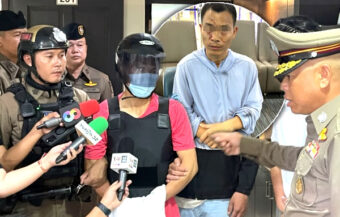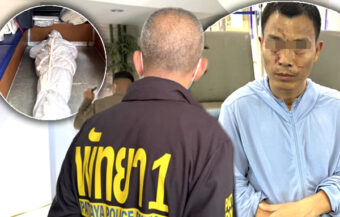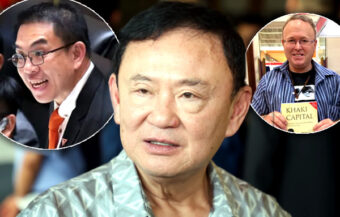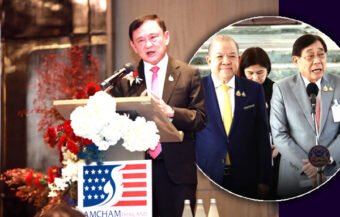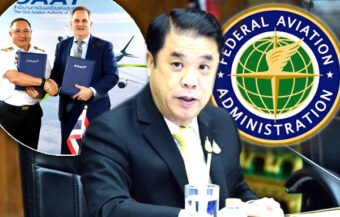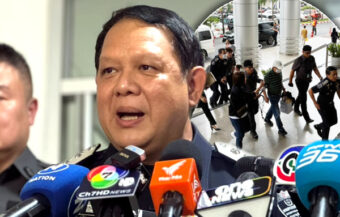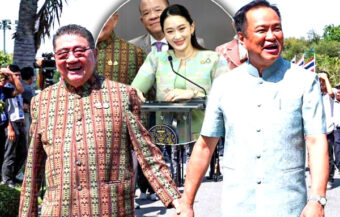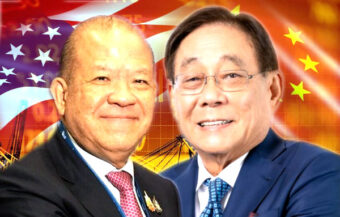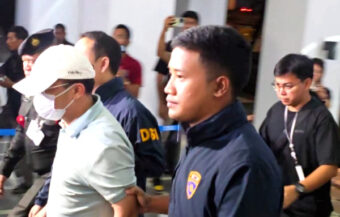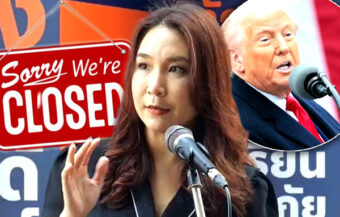Right now Thailand’s economy is being held hostage by events on the international stage increasingly driven by a hawkish tone since the advent of Trump economics. The US China trade war and a deterioration in even China’s prospects, is impacting the Thai economy in obvious and less obvious ways. The strength of the Thai baht is curtailing the prospects for Thai exports while Thai officials are constrained in their room for manoeuvre. The irony is that as Thailand continues to be a target for inward investment, the Thai public is burdened by an oppressive level of household debt. Thankful for a low inflation rate in the midst of all this, Thai officials are trying to hold course on to what was up to the middle half of last year, a bright economic picture. Hope for a recovery of economic growth is now being pinned on an improvement in international conditions, the continued development of Thai tourism, infrastructural improvements and the emergence of a stable Thai government in June.
Figures expected out this week will show Thailand’s export industry is not performing well as a decline is expected for March. This comes as economists revise their projections for the Thai economy downwards. The Finance Minister, Apisak Tantivorawong, this week revealed that his ministry is considering a financial stimulus to boost what is increasingly seen as an economy running out of steam. With the prospect of political deadlock over the formation of a new government becoming increasingly stark, both Thailand’s Finance Minister and its Bank of Thailand Governor this week made pronouncements emphasizing the urgency of the economic situation and the desirability that a stable Thai government be in place by June this year.
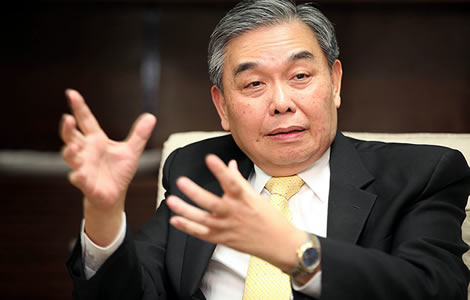
Thailand’s Finance Minister has suggested that economic growth for the first two months of the year may be as low as 3% even as this week the Bank of Thailand reduced its forecast for economic growth to 3.8%. All the indicators are pointing to a the Thai economy losing steam. The fall off began towards the end of 2018. One of the chief factors in the decline is a fall of in exports due to a stubbornly high Thai baht and severe complications on the international stage brought about by the US China trade spat.
Figures due out this week expected to show Thai exports down again for March
Figures expected out in a few days time are also expected to point towards a decrease on Thai exports. A report this week issued by Bloomberg suggests that Thailand’s exports for March will be off by as much as 4% from last year in what is now becoming a consistent pattern. The official figures from Thai authorities is due on April 22nd.
Bank of Thailand Governor suggests political resolution important for the Thai economy
Thai Governor at the Bank of Thailand, Veerathai Santiprabhob, this week suggested that an early resolution to a tense political standoff between two opposing sides that has emerged after the March 24th election would help ease concerns about the economy and allow the government to proceed with key infrastructural investments and decisions on trade.
Challenging political situation thrown up by the election result must be resolved
Thailand’s new parliament is expected to meet by early June. There are two competing parties seeking to form a coalition government with broad enough support to function within Thailand’s lower house of parliament. On one side there is the Palang Pracharat Party, which emerged surprisingly strong out of the March election. It supports the policies of the current junta government and Prime Minister Prayuth Chan ocha. On the other, there is the Pheu Thai Party, the former ruling entity before the 2014 coup, which wants a return to full democratic control of the country including either the abolition or rewriting of the 2017 constitution which imposes a range of strict measures on future Thai governments and enshrines an ongoing and powerful role for the Thai military.
Finance ministry mulling over a ฿20 billion stimulus package for Thai economy this year
This week, on Friday, the Finance Minister revealed that that his department is actively considering a ฿20 billion financial injection into the Thai economy to spur growth. As well as political uncertainty and declining exports, there has also been a tightening of money supply with strict measures coming into force on April 1st which are aimed at combating Thailand’s critical problem of household debt which towards the end of 2018 starting to rise again and is approaching 70% of Gross domestic product. Some unofficial estimates actually puts the figure at up 80% as casual and off the record borrowing in Thailand is quite rife.
Plan to boost burgeoning secondary tourism sector and assist those on low incomes
The Thai Finance Minister, Apisak Tantivorawong, said in Bangkok on Friday: ‘We want the measures to be effective during the second and third quarters in order to make sure the economy won’t be slumping when the new government comes in.’ The package includes extending tax breaks and popular financial incentives which are aimed at benefiting secondary regions in Thailand engaged in the tourism industry while also supporting income levels for the less well off, particularly in rural Thailand.
The success of Thailand’s tourist industry is still one bright spot in an overall pessimistic economic scenario right now. Part of that huge success in the last few years has been achieved by growing the range of tourism offerings in the kingdom and decentralising tourism in to new areas, a move which appeals to more discerning and younger class of visitor which Thailand is now attracting.
Bank of Thailand Governor concerned about political deadlock and the effect on the Thai economy
This week also saw the Bank of Thailand Governor, Veerathai Santiprabhob, warn about the emerging political deadlock. While the incumbent Prime Minister Prayut Chan ocha has won the election, given the powers conferred upon the the higher house in electing a prime minister, there is a new determination to ensure that the next Thai government has also the support of the lower house of parliament. Here matters after the general election result are less straightforward with both parties shoring up emerging blocs of support of equal weight, each determined to elect a Prime Minister and government from within that chamber.
Bank hopes that a stable government will boost confidence for a second half recovery in 2019
The Bank of Thailand boss suggested on Friday that if a sustainable Thai government can be formed by June, it may help spur confidence and see growth resume in the second and third quarters of the year. As 2019 stands, it is increasingly looking like the first half of the year does not spell good news of Thailand’s economy at all. Problems have only deepened since the start. The calls and guidance from senior economic figures are a signal to newly elected lawmakers and politicians to get their heads together for the sake of the country.
Many analysts already see the growth rate for 2019 at only 3% as conditions now stand
In his analysis, the Bank of Thailand boss referred to what is increasingly looking like an optimistic projection of growth for the year of 3.8%. Many more negative commentators are already talking about a figure of between 3 and 3.3% at this stage. However, the Bank of Thailand governor still held out hope of a growth rate of up to 4% if matters can be addressed by Thailand’s political leadership. He pointed to decisions required for the national budget. Any new government must act to underpin the growing importance of public private partnerships in infrastructure as well as project spending and the public budget for such schemes. Thailand has been in the midst of an ambitious infrastructural programme and impressive efforts to establish the eastern economic corridor as part of the Thailand 4.0 agenda.
Thai officials have very limited room to act as many of the economic challenges are external and relate to the impact Trump economics
One of the key problems for the Bank of Thailand is that it now limited in its scope to increase borrowing costs which may in turn lead to a higher value in the bath as Thailand is seen to offer a more attractive interest rate to depositors. The high value of the baht is being driven ironically but what is still seen as prudent economic management by the junta government of economic affairs, interest rates and events on the international stage where right now, there is a high level of economic and political uncertainty. One the biggest problems is that US China trade war. Although there are optimistic noises of a result to ongoing high powered negotiations between the US and China, figures out only this week suggest that the United States economy is benefiting from the disruption despite the all predictions of experts. This will not be lost on the US President Donald Trump.
Further political considerations may also impact Thailand’s economy even after democratic government takes office
While the Bank of Thailand governor puts a lot of faith in a boost to investor confidence generated if a political resolution or compromise can be reached in Thailand’s new parliament, he also alluded to further questions of uncertainty. Key decisions will have to be taken by any new government on economic policies and one key issue is the minimum wage. A number of parties are committed to hiking it if they have the power to do so. The Palang Pracharat Party and the current regime are committed simply to pursuing current policies and strategies.
Junta appears to oppose the idea of a national or reconciliation government being mooted
The tense political situation has seen calls for a national government or government of reconciliation to be formed. The response to this from the junta and the current prime minister has not been positive. The influential Deputy Prime Minister, Wissanu Krea-ngam, seen as politically close to Prime Minister Prayut Chan ocha, even suggested on Friday that there was no legal framework to permit such a resolution. He pointed instead to a legal mechanism already built into the charter. This refers to the provisions that stipulates that if an impasse arises following a vote in the lower house of parliament for the position of prime minister, then the upper house or senate assists in determining the outcome. A similar point was made by an MP elect for the Democrat Party who proposes that Section 272 be employed to decide who would be Prime Minister.
Senate may play its part in selecting the next Prime Minister if impasse develops
In such a scenario, the choice for prime minister could be anyone either outside the party list nominees or even the parliament itself. Combined with this, the next consideration would be to ensure that the new prime minister commands enough support in the lower house to allow a stable government to emerge.
Thailand moves towards Coronation Day and Thai people are already preparing
As Thailand moves towards Coronation Day, the attention of the public is already moving towards that auspicious event with Thai citizens buying clothes and preparing for the festivities. In the meantime, the election commission is grappling with a number of controversies, not least, the proper formula for calculating votes for party list MPs for the lower house. A date of May 9th for finalizing the final election results has already been questioned. Any delay could possible throw out the first meeting of the new Thai parliament. However, we already have a firm idea of the battle lines, agendas and political moves of the various parties.
Politicians should be in no doubt about warnings on the economy and the need for a resolute government in increasingly choppy economic waters
This week the Thai Finance Minister and the Bank of Thailand Governor have let the political leadership in no doubt, Thailand needs a stable government and there is big economic challenge ahead in what is emerging as an increasingly unstable and unpredictable economic and international environment.



